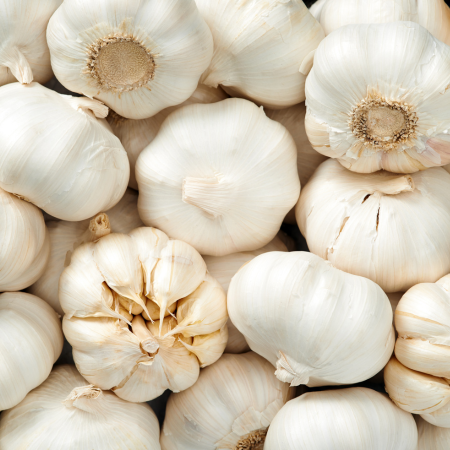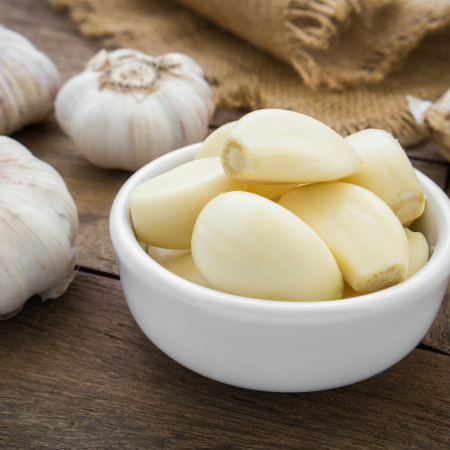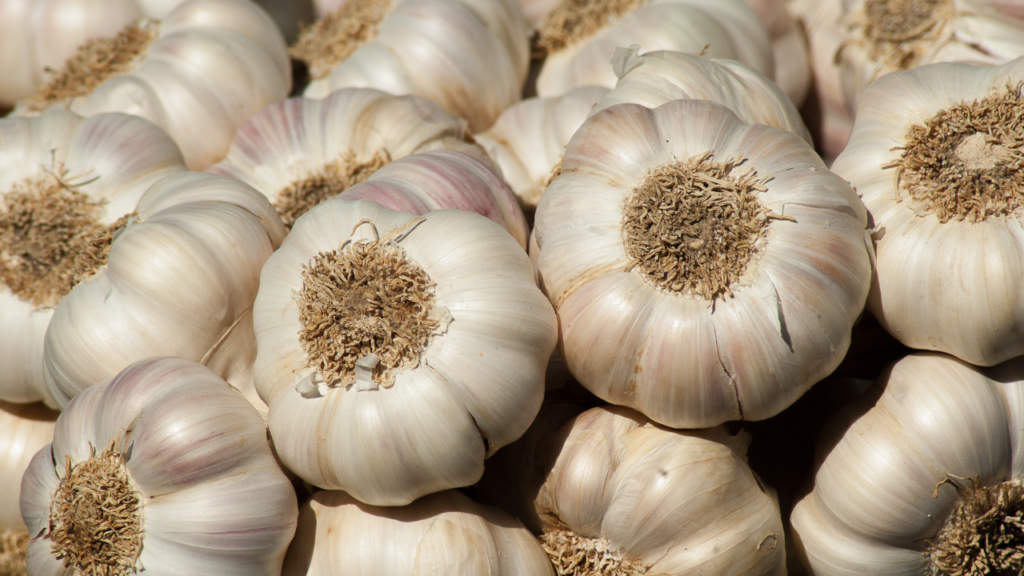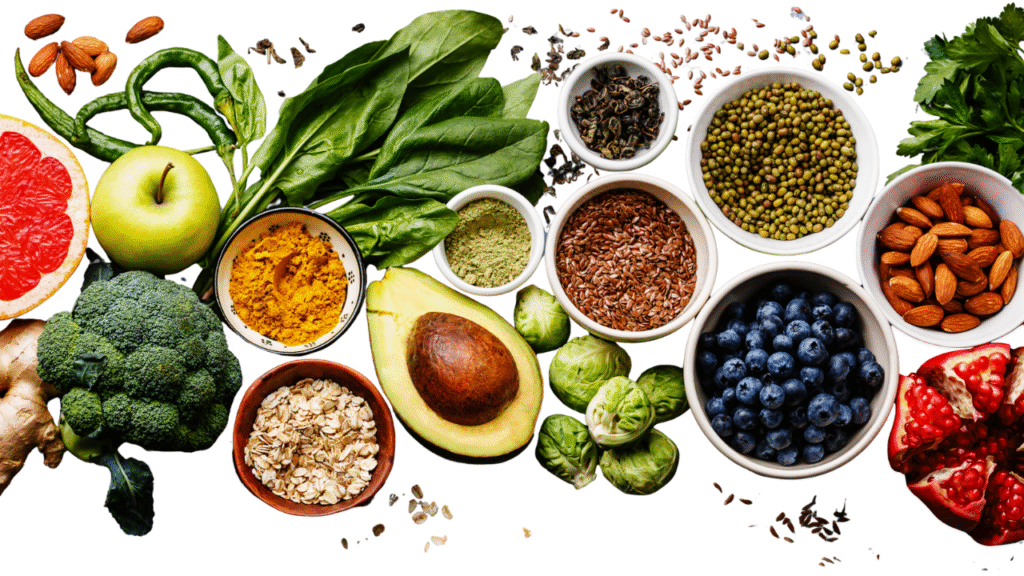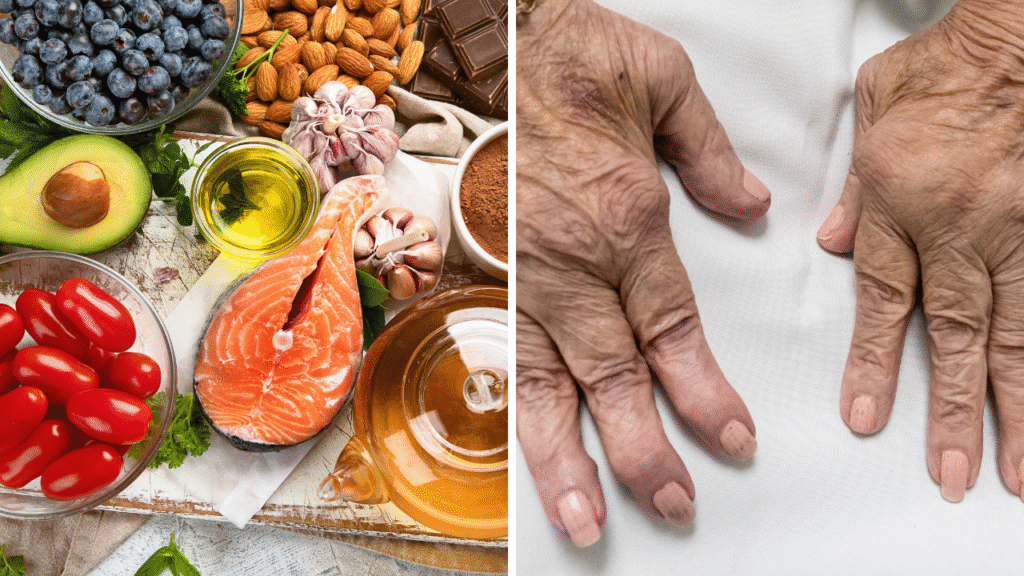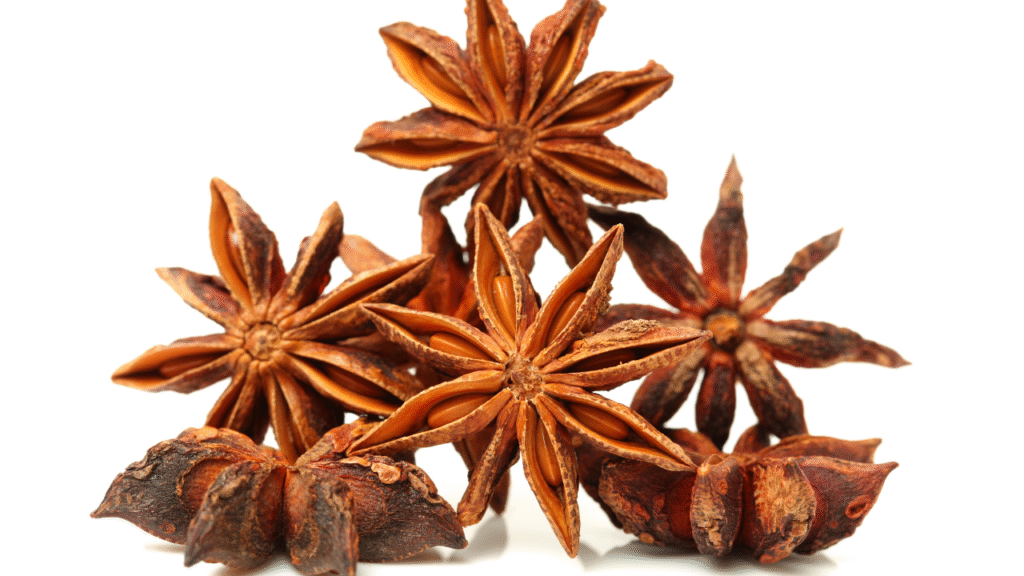Garlic’s immune-boosting properties are primarily attributed to Allicin and sulfur-containing compounds, which exhibit antimicrobial, anti-inflammatory, and antioxidant effects.
Garlic, often celebrated for its culinary prowess, holds a hidden power beyond its flavor-enhancing properties. Its influence extends to health, particularly in bolstering immune defenses.
Garlic contains Allicin, responsible for its distinct aroma and many health benefits. Allicin is formed when garlic is crushed or chopped, and it has been shown to have antibacterial, antiviral, and antifungal properties. Garlic also contains other sulfur compounds that contribute to its health benefits.
Immune-Boosting Properties of Garlic
1. Allicin
Allicin exhibits anti-inflammatory, antimicrobial, and antioxidant properties, supporting immune function. These compounds interact with the body to enhance overall wellness, supporting various bodily functions and promoting optimal health.
Allicin is responsible for garlic’s distinctive odor and taste, but more importantly, it exhibits potent antimicrobial activity. Allicin is a powerful ally in the body’s defense against diseases since studies have demonstrated that it may suppress the growth of many bacteria, viruses, and fungi. Alliinase converts the sulfur-containing compound into Allicin when garlic cloves are crushed, chopped, or chewed. (2)
2. Sulfur compounds
Beyond Allicin, garlic contains various sulfur-containing compounds, contributing to its immune-boosting properties. These substances are essential in controlling immunological responses by promoting the development and function of immune cells like lymphocytes and macrophages.
3. Antibacterial
Garlic has strong antibacterial properties. According to a study published in the Journal of Antimicrobial Chemotherapy, a compound in garlic named diallyl disulfide is 100 times more potent than two common antibiotics for fighting Campylobacter. The garlic compound could destroy the bacteria in just a fraction of the time taken by the antibiotics. (35)
4. Antiviral effects
Garlic has long been associated with immune-boosting and antimicrobial benefits. Most of its health benefits come from the sulfur compound allicin, released when garlic is cut, crushed, or chewed. A recent study suggests garlic may boost the body’s immune system to better deal with viral infections.
5. Antioxidant Properties
Garlic contains antioxidants that help protect the body from oxidative damage caused by free radicals. Antioxidants can also help prevent chronic disease and may play a key role in sexual health and fertility.
Fresh garlic and aged garlic extract are rich in antioxidants and can help neutralize harmful compounds known as free radicals (12).
According to one study among 100 men with infertility, taking an antioxidant supplement increased sperm count (13).
Interestingly, one study in rats with diabetes found that S-allyl cysteine from garlic improved erectile function by blocking the formation of free radicals (14).
However, additional studies are needed to understand how the antioxidants in garlic may affect sexual function and fertility in humans.
6. Anti-Inflammatory Effects
Garlic has anti-inflammatory effects that can help reduce inflammation in the body. Chronic inflammation is linked to many diseases, including cancer, heart disease, and Alzheimer’s disease. Garlic contains antioxidants that can help reduce inflammation and protect against oxidative damage.
Furthermore, garlic’s anti-inflammatory properties can help mitigate excessive immune responses contributing to inflammatory conditions. By reducing inflammation, garlic may support immune function and promote overall health.
7. Garlic’s role in stimulating immune cell production
It has been attributed to antioxidant, anti-inflammatory, and immunomodulatory capacities. Garlic, particularly its organosulfur compounds, can maintain immune system homeostasis through positive effects on immune cells, primarily by regulating cytokine proliferation and expression. This indicates that garlic appears to enhance the functioning of the immune system by stimulating certain cell types, such as macrophages, lymphocytes, natural killer (NK) cells, dendritic cells, and eosinophils, by mechanisms including modulation of cytokine secretion, immunoglobulin production, phagocytosis, and macrophage activation. {5}
Related: How to Boost Your Immune System Naturally with Food – SunDrg Health
How Garlic Strengthens the Immune System
Studies have shown that garlic effectively kills microorganisms responsible for some of the most common infections, including the common cold. It helps prevent colds and other infections.
One study found that those who supplemented with garlic were less likely to get a cold, and if they did, they recovered faster than those who didn’t. The study attributes garlic’s ability to prevent the common cold to its active component, Allicin. Its antimicrobial, antiviral, and antifungal properties can help relieve the common cold and other infections.
A study published in 2016 found that supplementing your diet with aged garlic extracts (AGE) can help to reduce the severity of cold and flu. One hundred twenty healthy adults took 2.56 g aged garlic extract supplements during the trial for three months. Researchers found that people who took garlic supplements during the “flu season” experienced fewer and less severe symptoms. (5)
Garlic helps to prevent cold and flu infections because garlic extracts can enhance immune cell function. This helps to build up the body’s defenses to lessen the severity of upper respiratory infections such as cold and flu. (7)
Increasing the amount of garlic in your diet can help fight the common cold and flu infections.
How to Incorporate Garlic into Your Diet
1. Raw garlic
Fresh garlic is recommended for maximum health benefits, as it retains the highest levels of active compounds, contributing to its health-promoting properties. Crushing, chopping, or mincing garlic best releases the compound Allicin, which is beneficial for your health. To make the most of its active compounds, it’s best to either consume it raw or crush/cut it and leave it out for a bit (10 minutes) before you add it to your cooked recipes.
Whether added to salads, sauces, dressings, soups, or stir-fries, garlic adds a flavorful punch to dishes while offering many health benefits.
Fresh garlic, garlic powder, and garlic oil flavor foods. Garlic may be used topically (applied to the skin)
2. Garlic supplements
Convenient for regular intake (capsules, powders)
Using a supplement is an excellent way to enhance your consumption of garlic. Speak with your doctor before taking garlic supplements. You may have a condition or take other medications that shouldn’t be mixed with garlic.
Follow the instructions on the bottle and any instructions your doctor has given you.
3. Garlic tea
Warm tea is a comforting way to get through a cold. Brewing garlic tea can also comfort you and may help boost your immune system. Steep a clove of chopped or minced garlic in hot water for a few minutes. Then strain the garlic bits out and enjoy your tea.
Add a bit of honey, lemon, or ginger to make the tea taste better.
Related: The Best 9 Herbs for Immune Support – SunDrg Health
Other Health Benefits of Garlic
1. Improved blood pressure
Garlic may help improve blood pressure and health.
One 2019 study into the effectiveness of Kyolic Aged Garlic Extract observed that an aged garlic extract significantly lowered blood pressure, pulse pressure, and arterial stiffness.
Researchers also suggest that garlic supplements are highly safe and can offer additional benefits for cardiovascular health, indicating that garlic extract is a valuable treatment.
However, researchers outline the need for further long-term trials to confirm garlic’s impact on cardiovascular-related mortality and morbidity.
Garlic may help improve blood pressure and health.
One 2019 study into the effectiveness of Kyolic Aged Garlic Extract noticed that an aged garlic extract substantially lowered blood pressure, pulse pressure, and arterial stiffness.
Researchers also suggest that garlic supplements are highly safe and can offer additional benefits for cardiovascular health, suggesting that garlic extract is a valuable treatment.
However, researchers outline the need for further long-term trials to confirm garlic’s impact on cardiovascular-related mortality and morbidity.
2. Lower cholesterols
A 2016 investigation into the effects of garlic and lemon juice found favorable effects on cholesterol. Researchers observed evidence that consuming half to one clove of garlic per day lowers cholesterol levels by around 9%. The researchers’ discussion of this statistic was based on a finding in a 1993 meta-analysis.
However, in a 1998 study, researchers also observed that garlic powders did not lower cholesterol levels, suggesting that raw garlic may be more beneficial for cholesterol.
3. May Protect Against Oxidative Stress
Consuming antioxidants is believed to mitigate oxidative stress from free radicals. Garlic contains phenolic compounds with powerful antioxidant properties. In particular, garlic has been revealed to help reduce cardiovascular risk in patients with obesity via enhanced antioxidants and reduced inflammation.
A meta-analysis of scientific trials has proven that supplementing with garlic modulates oxidative stress markers, including total antioxidant capacity.
Precautions and Considerations
Gastrointestinal Discomfort: it’s essential to know that raw garlic can irritate the GI tract.
Excessive consumption of garlic, particularly raw garlic or garlic supplements, may cause gastrointestinal side effects such as heartburn, bloating, and nausea.
Interactions with Medications: Garlic supplements may interact with certain medications,
Garlic, a natural blood thinner, can increase bleeding risk in any form. It can intensify the effects of anticoagulants like aspirin or warfarin, which can increase the risk of bleeding.
Speak to your doctor before consuming raw garlic if you take blood thinners.
Potential for Odor: Garlic’s pungent odor can linger on the breath and skin after consumption, which may be undesirable for some individuals. Using odor-neutralizing techniques like chewing fresh parsley or consuming milk with garlic-containing meals may help mitigate garlic breath.
Conclusion
Garlic and garlic extracts offer many potential health benefits due to their nutritional properties and the compounds they contain.
Garlic benefits include areas of health concerning bone strength, infection and inflammation, skin health, cancer, and more.
Incorporating garlic into your diet can enhance your immune defenses and support overall health.
Garlic can have side effects, so contact your doctor before starting supplementation.
Frequently asked questions
Is garlic good for you?
Yes! While many studies have demonstrated garlic’s anti-inflammatory and antimicrobial benefits, there is also promising research that garlic could help prevent and manage certain types of cancer. Additionally, garlic’s health benefits may reach even further, promoting better gut health, helping you live longer, resisting osteoporosis, and improving cardiovascular health. Below are eight science-backed ways garlic may benefit your health.
Can garlic boost my immune system?
While garlic is not a magical cure-all, numerous studies suggest it may have immune-boosting properties. Compounds like Allicin in garlic exhibit antimicrobial activity, potentially helping the body fight infections. Additionally, garlic contains sulfur-containing compounds that support immune function. Incorporating garlic into your diet as part of a balanced, healthy lifestyle may contribute to overall immune health.
Are there any potential side effects or interactions associated with garlic consumption?
When used in cooking, garlic is generally harmless for most people, but too much of it might cause indigestion or other gastrointestinal Discomfort. Taking supplements containing garlic may increase the risk of bleeding if they mix with certain drugs, such as blood thinners and anticoagulants. It’s best to speak with a healthcare professional before starting any new supplements or drastically increasing your intake of garlic if you have any underlying medical concerns or are on medication.
How should one take powdered garlic?
Garlic powder can be used to prepare foods such as broths, soups, chicken, fish, meat, beans, pates, and sauces in the most varied types of recipes.
What happens if I eat garlic every day?
Many cultures around the globe enjoy garlic daily, and the chances of unpleasant effects are low. Since we tend to eat it in small quantities, you may be more likely to reap the health benefits of garlic if you eat it more often. However, if you have gut issues like irritable bowel syndrome (IBS), garlic may cause gas and bloating.
Does garlic burn belly fat?
Some people claim that garlic’s anti-inflammatory properties “burn belly fat,” but this isn’t true. Eating garlic hasn’t been shown to result in long-term sustained weight loss.
What is the healthiest way to eat garlic?
Eating garlic as close to raw as possible is the healthiest way since the allicin content will be at its peak. The more garlic is processed and cooked, the lower the allicin content.
Does Garlic Help Boost Immunity?
Garlic contains compounds that help the immune system fight germs.
Allicin, the main ingredient in garlic, is formed when garlic is crushed or chewed.
The sulfur in garlic helps your body absorb zinc, an immunity booster.
Allicin in garlic stimulates immune cells like macrophages, lymphocytes, and natural killer cells.
How much garlic should you eat per day for Immune Health?
While there is no established effective dosage of garlic, some studies on raw garlic use 100 mg of crushed raw garlic per kilogram of body weight twice per day. This equals about three to four cloves per day (8}
You may also take an aged garlic extract supplement. Studies investigating the health benefits of aged garlic use varying dosages ranging from 240 to 2,560 mg (6, 9).
High intakes of garlic supplements can be toxic, so don’t exceed the dosage recommendations.
How Garlic Fights Off Infections Naturally
Garlic can help tackle three types of infections: bacterial, viral, and fungal. The best part of garlic’s antibacterial activity is that the Allicin tends to only interfere with disease-causing bacteria rather than the “friendly” bacteria, such as Lactobacillus, that colonize and benefit the intestines.
Click Here For More Resources

